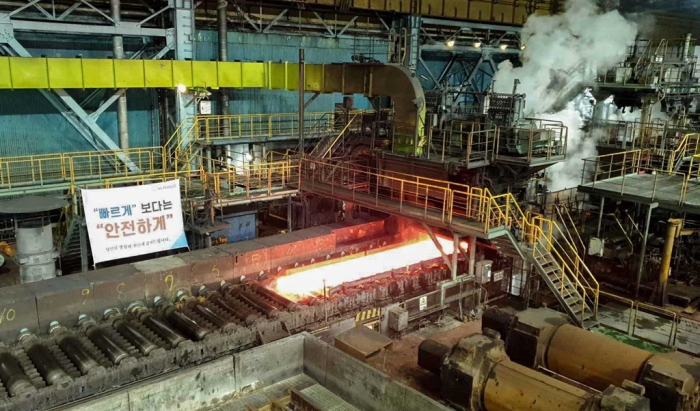Steel
Korean steelmakers to raise prices further
Steel price hikes may prompt customers such as shipbuilders to seek more imported products
By Feb 05, 2024 (Gmt+09:00)
1
Min read
Most Read
Hankook Tire buys $1 bn Hanon Systems stake from Hahn & Co.


S.Korea's LS Materials set to boost earnings ahead of IPO process


NPS to hike risky asset purchases under simplified allocation system


Aman, Rosewood, Banyan, IHG rush to open luxury hotels in Seoul


Osstem to buy BrazilŌĆÖs No. 3 dental implant maker Implacil



South KoreaŌĆÖs top steelmaker POSCO Holdings Inc. and its domestic peers are poised to raise product prices further to cut losses amid surging costs, even as the industry struggles to compete with its Chinese and Japanese rivals offering cheaper goods.
POSCO, the worldŌĆÖs No. 7 steelmaker, and its smaller rival Hyundai Steel Co. plan to increase the prices of hot-rolled steel plate to about 900,000 won ($672.8) per ton this month, the highest since October 2023, according to industry sources on Sunday. They already ramped up prices by 2.5% in January from the previous month ŌĆö to 865,000 won per ton.
These hikes have boosted overall steel prices, as hot-rolled steel plates are key materials in the manufacture of most other products including cold-rolled and electrical steel sheets.
Hyundai and Dongkuk Steel Mill Co. are set to raise the prices of H beams used in construction by some 50,000 won per ton again this month after similar increases in January.
ŌĆ£It was a difficult decision to jack up prices when demand has weakened over the sluggish construction industry,ŌĆØ said a steel sector source.
POSCO said its earnings are unlikely to improve markedly in the first quarter due to cost pressures, adding that it expects it to take time to reflect rising costs.
INVASION OF CHINESE, JAPANESE STEELMAKERS
Korean steelmakers had held back from raising prices in the second half of 2023 as they sought to defend market share against their Chinese and Japanese rivals, which supplied products at prices about 10% lower than those in the local market.
KoreaŌĆÖs imports of steel products from China and Japan totaled 8.7 million tons and 5.6 million tons, respectively, last year ŌĆö their highest levels since 2017.
Price hikes by POSCO and its domestic peers may prompt their domestic customers to seek more imported steel, industry sources in Seoul said.
ŌĆ£In terms of quality, we see little difference among domestic, Chinese and Japanese steel,ŌĆØ said an official at a Korean shipbuilder. ŌĆ£The local steel industry is rapidly shifting from a seller's market to a buyerŌĆÖs market.ŌĆØ
Write to Hyung-Kyu Kim at khk@hankyung.com
┬Ā
Jongwoo Cheon edited this article.
More to Read
-
 SteelKorean steelmakers mull anti-dumping suit vs Chinese, Japanese firms
SteelKorean steelmakers mull anti-dumping suit vs Chinese, Japanese firmsJan 17, 2024 (Gmt+09:00)
3 Min read -

-
 SteelJapanese steelmakers flood South Korea on back of weaker yen
SteelJapanese steelmakers flood South Korea on back of weaker yenSep 20, 2023 (Gmt+09:00)
4 Min read
Comment 0
LOG IN


